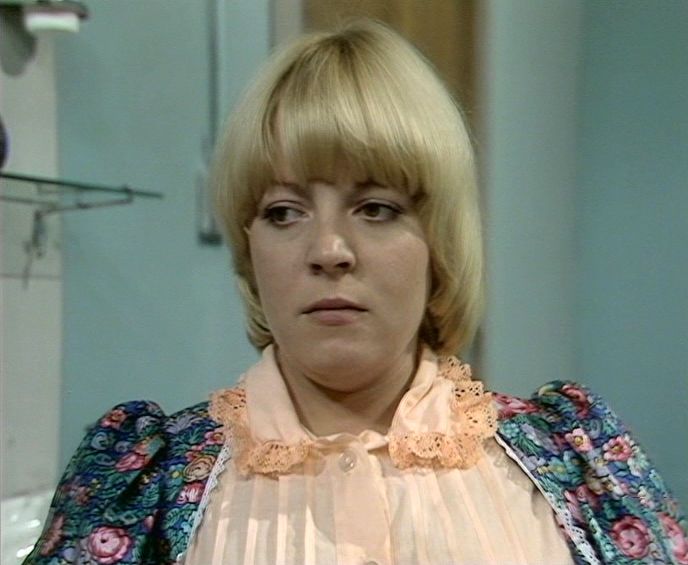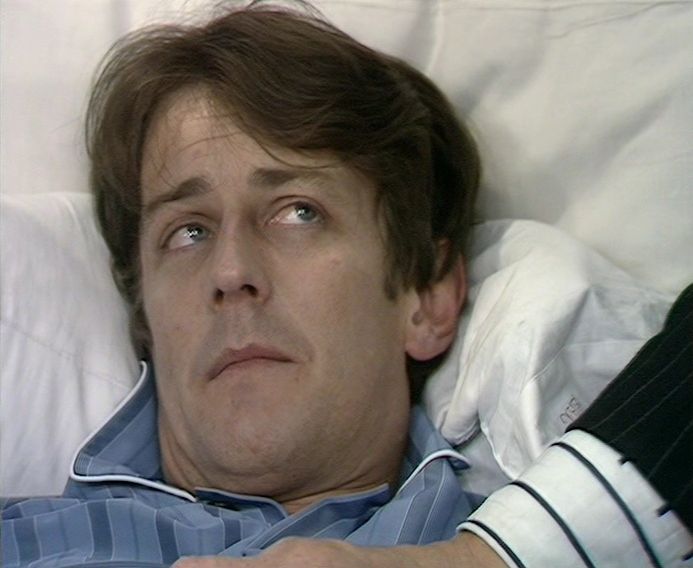The Capture. Hmm, I wonder what this episode’s about then?
Turpin and Swiftnick aren’t getting on terribly well as Swiftnick’s rash and impulsive actions have almost led to disaster several times. As they ride up to the White Lion inn, the long suffering Turpin gives Swiftnick one last chance.
But he proves to be a less than effective lookout, instead spending most of his time chatting up a serving wench called Kate Doyle (Lesley Dunlop). Dunlop, who’d later co-star in a similar adventure series (Smuggler, with Oliver Tobias) is good value as Kate – all wide eyes and heaving bosoms.
When she makes conversation, Swiftnick (a pushover for a pretty face) just can’t help himself and he rashly reveals the identity of his friend. When, seconds later, Spiker and his goons crash through the door it seems to Turpin that Kate must have informed on them. She didn’t of course, and it seems bizarre that he could have thought so.
Turpin and Swiftnick escape by the skin of their teeth after another highly energetic fight sequence that slips into parody (after bamboozling Spiker again, Turpin makes time to stop and kiss a pretty girl before exiting) but is still entertaining.
Turpin decides that enough is enough and dumps the unwilling Swiftnick with a gunsmith called John Tanner (Harold Goodwin). Tanner’s reluctant to take on the boy as his apprentice, but changes his mind after Turpin gives him a handsome dowry! Goodwin sketches a nice cameo with limited screentime as does Annabelle Lee (as Jane Kelsey), the episode’s other notable guest actor.
Jane is a down on her luck actress, sentenced to three years imprisonment by Glutton for stealing two apples (a good example of Glutton’s draconian application of the law). She’s promised her freedom if she agrees to ensnare Turpin by posing as a wealthy aristocrat.
This part of the story doesn’t quite hold water. How does Turpin know the precise time and road that this faux lady will be travelling down? Still ignoring that plot niggle, there’s amusement to be gained from Jane’s over-enthusiastic acting as she plays the wilting heroine (quailing against the rough, tough Turpin). Given that some performances in the series can be just as florid (and they weren’t acting, if you see what I mean) this is possibly a little in-joke from Carpenter.
Jane wasn’t riding alone, as Spiker was hiding in her carriage. Easily overpowering Turpin, it looks like curtains for the highwayman ….
In a neat reversal of the first episode, in this one Swiftnick (with a little help from Kate) rescues Turpin. As expected, that redeems the boy in Turpin’s eyes and the pair ride off together in unity as the credits roll.
A good enough episode, but fairly predictable (had Kate actually turned out to be an informer that would have been a decent twist). On the plus side, the swordplay’s once again well staged and the Glutton/Spiker double act raises several laughs (the running gag of Spiker’s failure to knock before entering Glutton’s room, for example).

















